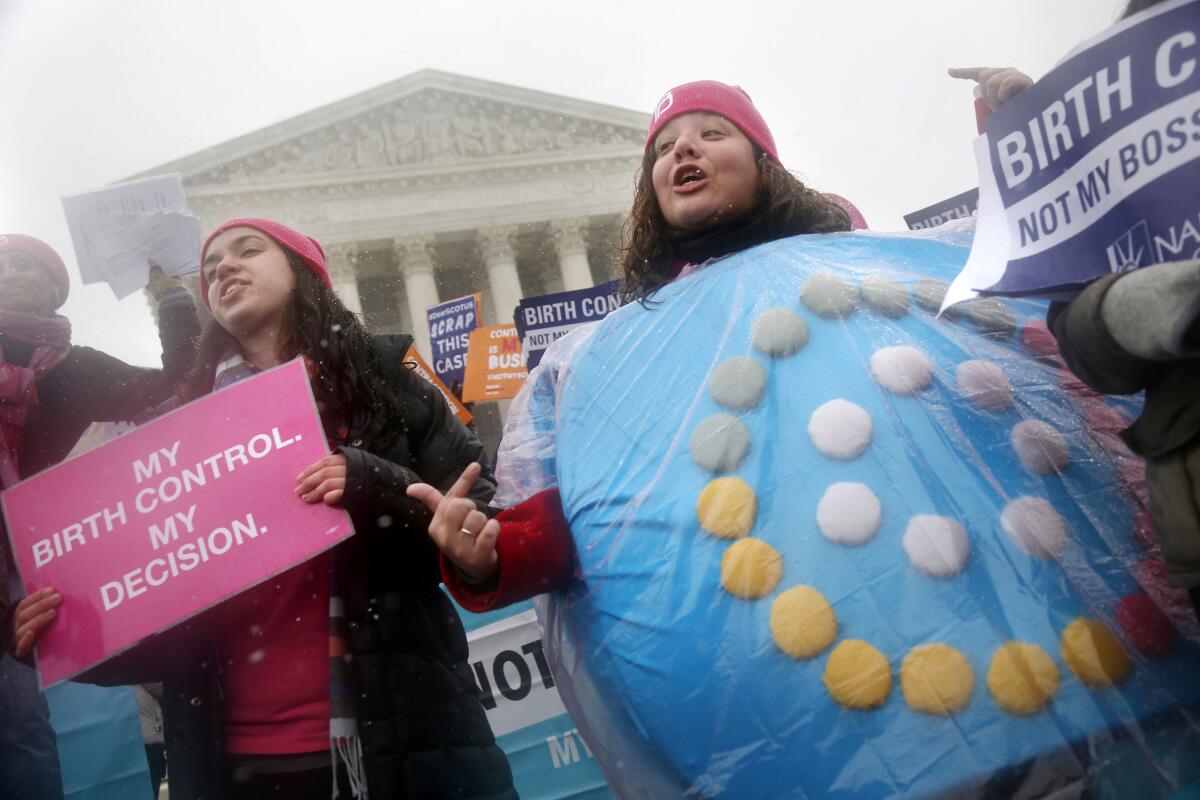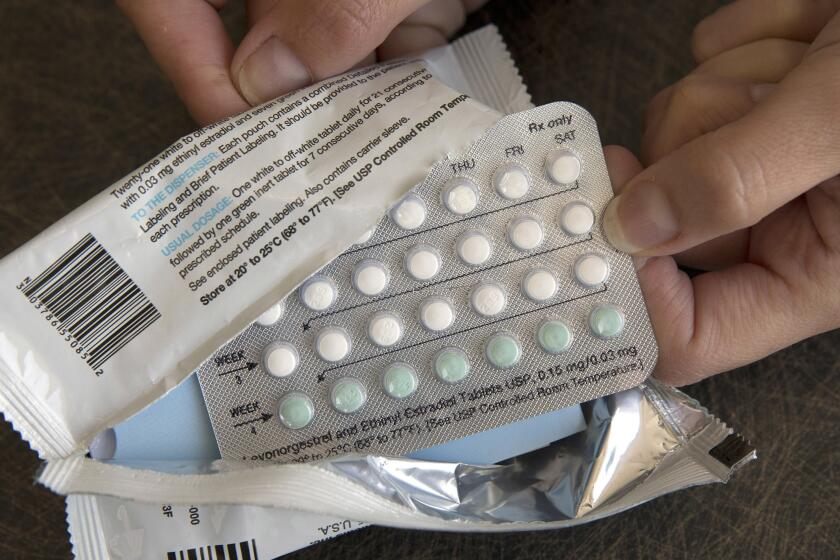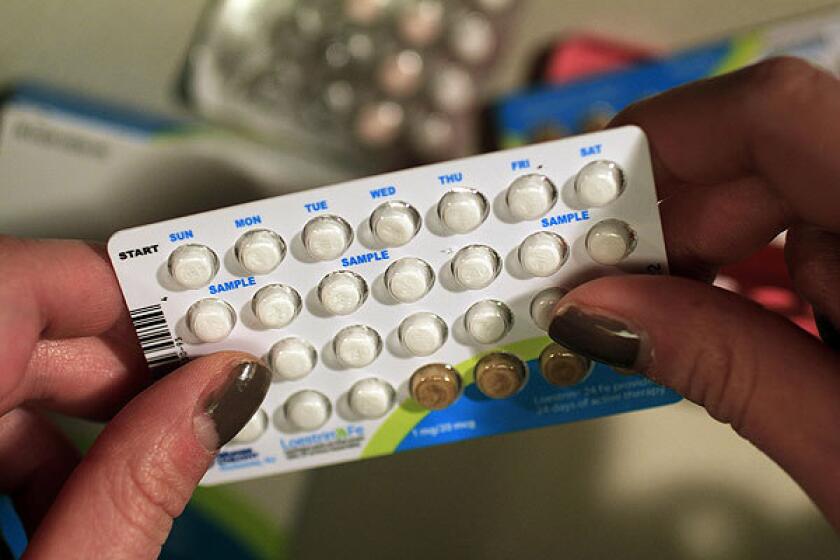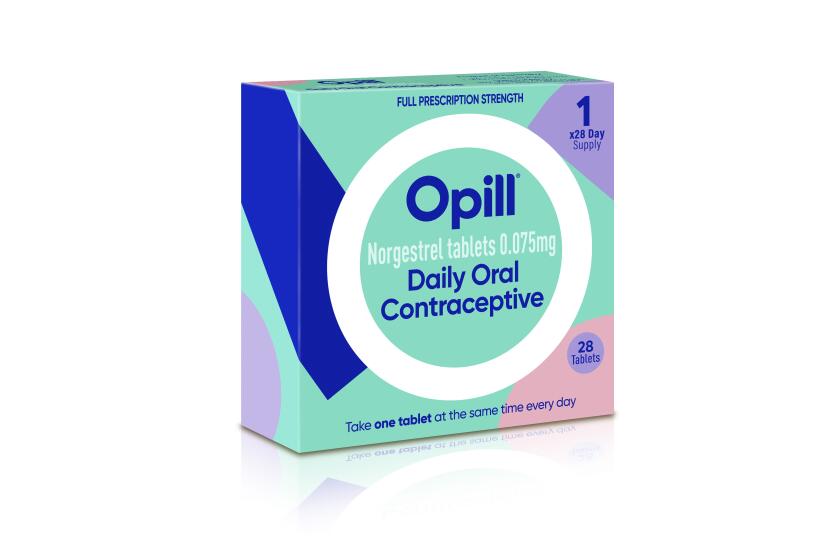FDA advisory panel backs over-the-counter birth control pill

- Share via
WASHINGTON — Federal health advisors said Wednesday that a decades-old birth control pill should be sold without a prescription, paving the way for a likely U.S. approval of the first over-the-counter contraceptive medication.
The panel of advisors to the Food and Drug Administration voted unanimously in favor of drugmaker Perrigo’s request to sell its once-a-day medication over the counter. The recommendation came at the close of a two-day meeting focused on whether women could safely and effectively take the pill without professional supervision. A final FDA decision is expected this summer.
If the FDA follows the nonbinding recommendation, Perrigo’s drug, Opill, would become the first contraceptive pill to be moved out from behind the pharmacy counter onto store shelves. The company said sales could begin late this year if the agency gives the OK.
Currently, a prescription is required for such pills in the United States.
A drug company is seeking U.S. approval for the first birth control pill that women could buy without a prescription
The outside experts said they were mostly confident that women of all ages could use the drug appropriately without seeing a health provider first.
“In the balance between benefit and risk, we’d have a hard time justifying not taking this action,” said Maria Coyle, an Ohio State University pharmacist, who chaired the panel. “The drug is incredibly effective, and I think it will be effective in the over-the-counter realm just as it is in the prescription realm.”
The positive vote came despite numerous criticisms from FDA scientists about how Perrigo studied the drug, including questions about whether study participants were able to understand and follow labeling instructions.
“We have an application with many complicated issues and uncertainties, including questionable reliability,” Dr. Pamela Horn of the FDA’s Office of Nonprescription Drugs told panelists on Tuesday.
But the panel largely set those concerns aside, emphasizing the benefits of providing more effective birth control, particularly to young people and lower-income groups, than what’s available over the counter now, such as condoms and diaphragms.
“I do believe this is a viable option to support access and will support the prevention of unintended and unwanted pregnancies,” said Jolie Haun, a researcher with the Department of Veterans Affairs, who voted in favor of the pill.
If Congress fails to revoke the FDA’s power to require a prescription to buy contraceptives, the FDA should make them available over the counter.
Most birth control pills used in the U.S. today contain a combination of progestin and estrogen. Opill is part of an older class of contraceptives that only contain progestin. They generally have fewer side effects and health risks but can be less effective if they’re not taken around the same time daily.
The FDA’s decision won’t apply to other birth control pills, only Opill, although advocates hope that an approval decision might push other drugmakers to seek over-the-counter sales. Birth control pills are available without a prescription across much of South America, Asia and Africa.
Nonprescription medicines are usually cheaper, but generally not covered by insurance. Requiring insurers to cover over-the-counter birth control would require a regulatory change by the federal government.
The Times looked into a male birth control that sounds promising, as well as the bigger debate about reproductive justice.
Opill was first approved in the U.S. five decades ago based on data showing it was more than 90% effective in preventing pregnancy when taken daily. But some women should not take it, particularly those with breast cancer, because of the risk that it could accelerate tumor growth. Women who have unusual vaginal bleeding are instructed to speak with a doctor before using it because bleeding could indicate a serious health issue.
But in reading comprehension studies conducted by Perrigo, 68% of women with unexplained bleeding incorrectly said they believed they could safely take the drug. And a few women with breast cancer also told researchers they could use Opill.
Panel members said almost all women with a history of breast cancer would be under the care of a cancer specialist, who would advise them not to take hormonal drugs that could make their condition worse.
“I would think any woman who had a breast cancer diagnosis in the past would be highly aware of that, so I don’t think that’s going to be a concern,” said Dr. Deborah Armstrong of Johns Hopkins University.
Perrigo said its 880-patient study showed that women will consistently take the pill daily if it’s made available over the counter. But the FDA found several problems in the study, including the fact that more than 30% of participants erroneously reported taking more pills than they were actually supplied with. FDA reviewers said the problem called into question the company’s overall conclusions about the drug’s use and effectiveness.
FDA regulators also suggested that changes in U.S. demographics since the pill was first tested — including increased obesity and other chronic conditions — could reduce the drug’s effectiveness.
U.S. health regulators are considering the first request to make a birth control pill available without a prescription. But the FDA has raised numerous concerns.
Despite those concerns, Opill has the support of dozens of reproductive rights and medical groups that have long pushed for expanded access to birth control.
“Opill over the counter would give us one more option for access and the more options that are available the better,” said Clare Coleman, president of the National Family Planning and Reproductive Health Assn.
Coleman was one of more than 25 speakers who supported Perrigo’s application during a public comment session Tuesday.
Catholic groups, including the United States Conference of Catholic Bishops, oppose the move, saying women should be evaluated by a doctor before getting it.
Even if the pill is approved, it’s unclear how popular it might be. Opill has not been marketed in the U.S. since 2005 and was previously owned by Pfizer. Perrigo acquired the drug with its buyout of French drugmaker HRA Pharma last year.









